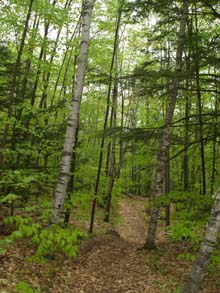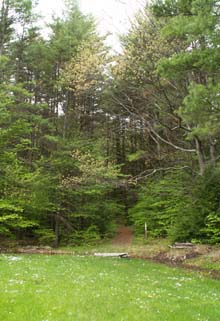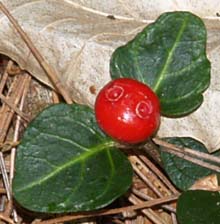
| Mountains: | Mt. Grace (1617'), Little Grace (1226') | |
| Trails: | Round-the-Mountain Trail, Metacomet-Monadnock Trail (M-M Trail) | |
| Region: | MA - Central North Mount Grace State Forest | |
| Location: | Warwick, MA | |
| Rating: | Moderate | |
| Features: | Summit, views, brooks, fire tower, loop hike | |
| Distance: | 4.6 miles | |
| Elevation Gain: | 1200 feet (cumulative) | |
| Hiking Time: | Actual: 2:25 Typical: 2:45 | |
| Outing Duration: | Actual: 5:00 Typical: 4:00 | |
| Season: | Spring | |
| Hike Date: | 05/16/2008 (Friday) | |
| Weather: | Sprinkles then steady rain, 50-60 degrees | |
| Author: | Webmaster |
Route Summary
This is a loop hike up over Mount Grace and Little Grace. In order to make the loop complete, the final 0.7 mile is a road walk.
Ascent
- From the parking lot head north (in the opposite direction of the administration building), sticking to the edge of the field and paralleling Route 78.
- Enter the woods at the north end of the field where there is an easily discernible path straight ahead.
- Follow this obvious trail, which is Round-the-Mountain Trail, marked by occasional plastic blue triangles affixed to trees.
- About 0.5 mile from the parking lot you will reach an open area that has been logged. Skirt around the area first bearing to the right. You will see a small vehicular bridge over a stream - stay to the left of the bridge and stream and then curve left to finish skirting the open area.
- About 0.1 mile from the start of the open area, bear left/straight to regain the woods trail where an obvious wide path heads uphill.
- About 0.2 mile after reentering the woods, there will be an unmarked cross trail; keep going straight on Round-the-Mountain Trail.
- Continue on the trail for 0.4 mile upon which you will reach a T-junction with Metacomet-Monadnock Trail (M-M Trail).
- Turning right would quickly bring you to Route 78. Instead turn left and head uphill on what is now both M-M Trail and Round-the-Mountain Trail. The route will now be blazed primarily in white although you may still see some blue markers for Round-the-Mountain Trail.
- After 0.2 mile you will arrive at a lean-to. The trail curves to the left in front of the shelter.
- Two (easy) stream crossings and 0.3 mile later, Round-the-Mountain Trail and M-M Trail split. Round-the-Mountain Trail goes to the right. Go straight/left to continue following M-M Trail, now blazed only with painted white rectangles.
- After an additional 0.8 mile on M-M Trail you will reach Mount Grace's summit and the fire tower. In this section, the path has been rerouted in a few places but just paying attention to the blazes will easily keep you on the designated trail while avoiding eroded areas. Very close to the top, another trail will join your route from the left, and then the fire road will join in, also from the left.

Descent
- Head down from Mount Grace's summit in the direction opposite from which you arrived.
- This is still M-M Trail so keep following the white blazes. The descent basically follows a pole line for 0.6 mile on a wide trail until meeting up with the fire road.
- At this point, turn sharply right on the signed M-M Trail. The path is now more narrow and the scenery more interesting.
- Begin climbing and 0.4 mile later reach the height-of-land on Little Grace's ridgeline, where there is a small but obvious outlook on the right of the trail.
- Continue along M-M Trail, reaching a T-junction after about 0.3 mile. M-M Trail continues right while Round-the-Mountain Trail goes left (and right). Turn left here to follow Round-the-Mountain Trail in a northeasterly direction.
- After about 0.1 mile there will be a faded sign (paper under plastic, attached to a tree) directing hikers to turn right for Round-the-Mountain Trail which is what you should do. The trail does continue straight ahead, eventually leading back to the fire road. However, descending on the fire road is not an option as it is soon blocked by a gate to private property where hiking is not permitted.
- Very quickly after making the right-hand turn, you will arrive at the paved Wendell Road.
- Turn left and follow the road for 0.2 mile. (Ignore the woods road on the opposite side of the street.)
- At the stop sign, turn left onto Route 78 and follow it for the final 0.5 mile back to the parking lot at Ohlson Field.

| Place | Split Miles |
Total Miles |
Split Time |
Total Time |
|||||
|---|---|---|---|---|---|---|---|---|---|
| Ohlson Field parking lot (900') | 0.0 | 0.0 | 0:00 | 0:00 | |||||
| Jct. Round-the-Mountain Trail/M-M Trail (600') | 1.2 | 1.2 | 0:36 | 0:36 | |||||
| Mt. Grace (1625') | 1.3 | 2.5 | 0:47 | 1:23 | |||||
| Little Grace (1226') | 1.0 | 3.5 | 0:28 | 1:51 | |||||
| Wendell Road (960') | 0.4 | 3.9 | 0:13 | 2:04 | |||||
| Ohlson Field parking lot (900') | 0.7 | 4.6 | 0:21 | 2:25 |

|
|
|||||
|
|
|||||
|

|
|
|||||

Trail Guide
This was a roundabout trail up to the fire tower topping Mount Grace's summit from which there are impressive views. Then after a partial descent, the route climbs up and over the pleasant and interesting ridgeline of Little Grace, before finally circling back to complete the loop. I was surprised that I had the entire park to myself - no other cars in the parking area and I didn't encounter anyone on the trails.
Since this is a long trip report, I've divided it into sections:
Ascent | Mount Grace Summit | Descent and Little Grace

Ascent
 The starting point was the parking lot for Ohlson Field at Mount Grace State Forest's main entrance. I headed out under a very light sprinkling of rain, walked along the edge of the damp field, and then crossed a small boardwalk over a wet area and entered into a piney forest. The footway soon changed from a carpet of pine needles to dead leaves as the hardwoods outnumbered the pines and this give-and-take between conifers and deciduous trees continued throughout the hike.
The starting point was the parking lot for Ohlson Field at Mount Grace State Forest's main entrance. I headed out under a very light sprinkling of rain, walked along the edge of the damp field, and then crossed a small boardwalk over a wet area and entered into a piney forest. The footway soon changed from a carpet of pine needles to dead leaves as the hardwoods outnumbered the pines and this give-and-take between conifers and deciduous trees continued throughout the hike.The undulating Round-the-Mountain Trail trends generally downhill until meeting Metacomet-Monadnock Trail. I stepped across a bridge spanning a small rocky stream with moss-covered boulders in the shade of hemlocks. Soon after I entered an area populated with towering white pines which was followed by an open logging area. The route passes by a bridge in this section. Take a small detour and check out the stream running under the bridge. It is a narrow waterway between walls of stone - possibly a millrace from the sawmill industry that was present in Warwick starting around the 1850's.
After skirting around the logging area and reentering the woods on an uphill, I encountered a small stream crossed by a boardwalk. In this area I discovered a bunch of striking red trilliums (Trillium erectum). This flower has three petals, three sepals, and three leaves, but just one flower per plant. There are several varieties of trilliums but this one grows 7-16 inches tall and has beautiful wine-red petals; sometimes the flower even has a magenta hue. This species may also be called purple trillium, or wakerobin.
The beauty of the red trillium always captivates me, but today I also observed an unusual condition that I'd never seen before - I'll call it the "strangled trillium". The plant must have poked up through the ground only to encounter a very tough dead leaf and rather than succeeding in nudging it aside, the stem grew right through the leaf and raised the leaf up as the plant itself gained height. What resulted is the dead leaf "strangling" the three leaves of the trillium so that they are all constricted around the stem. But the flower persevered and still produced its bloom, although the petals aren't open as wide as its unrestricted neighbors.


I continued along Round-the-Mountain Trail in the deep shade beneath conifers where partridgeberry (Mitchella repens) was flaunting its bright red berries and Canada Mayflower, also known as wild lily-of-the-valley (Maianthemum canadense) was just starting to bud. The evergreen wintergreen (Gaultheria procumbens), although not in fruit or flower, also contributed interest to the forest floor which was primarily littered with pine needles and dead leaves.
 Next I encountered some old, rusting, man-made structures off to the left of the trail; namely an engine as well as a series of pulleys leading uphill through the undergrowth. This is the remains of a downhill ski slope which was active from about 1952 until the 1970's and made use of a rope tow. In 1953, an ad for the "20 Club Ski Area" boasted that both night and day skiing was available and that parking was free. Downhill skiing on Mount Grace was popular long before the "official" ski area with lifts was established. In 1936 there were two popular ski trails starting from the summit. The "Pro" trail was a mile long while the "Novice" trail was 0.8 mile. After each descent, these dedicated skiers had to hike back up the mountain for the next run. There was also a designated snowshoe trail which roughly followed the route of today's Round-the-Mountain Trail.
Next I encountered some old, rusting, man-made structures off to the left of the trail; namely an engine as well as a series of pulleys leading uphill through the undergrowth. This is the remains of a downhill ski slope which was active from about 1952 until the 1970's and made use of a rope tow. In 1953, an ad for the "20 Club Ski Area" boasted that both night and day skiing was available and that parking was free. Downhill skiing on Mount Grace was popular long before the "official" ski area with lifts was established. In 1936 there were two popular ski trails starting from the summit. The "Pro" trail was a mile long while the "Novice" trail was 0.8 mile. After each descent, these dedicated skiers had to hike back up the mountain for the next run. There was also a designated snowshoe trail which roughly followed the route of today's Round-the-Mountain Trail.A short ways beyond this point, I came into sight of lovely Mountain Brook. It meandered prettily through the woods with Route 78 not too far beyond its opposite bank.
Soon after this short glimpse of the brook, I reached the junction with Metacomet-Monadnock Trail, also referred to as M-M Trail. Here I turned left (which is both M-M Trail and Round-the-Mountain Trail) and headed uphill for the real climb to Mount Grace which was 1.3 miles away at this point. The trail started out with gentle inclines with some stone walls to the left of the trail. It crossed a noisy stream; some of the water flowed through a culvert but it also ran across the footway. Upstream was a tangle of moss-covered rocks and downstream I could hear the water dropping a ways but didn't get a good view of it.
Just after the crossing was a lean-to, picnic table and fire pit. It looked like a peaceful place to spend an evening. I crossed a couple more streams and then arrived at a junction where Metacomet-Monadnock Trail and Round-the-Mountain Trail part ways. I veered left to stay on M-M Trail and the climb from here to the summit was steadier, proceeding at a moderate slope up the mountain. After a final ledgy pitch, I arrived on the summit.

Mount Grace Summit
The peak itself is viewless with an open grassy area, a big boulder, some white pines, some low sweet blueberry bushes (Vaccinium angustifolium), a couple geological markers, and of course, the fire tower topped by an enclosed cab.
The tower is an eight-platform, 68-foot high steel structure constructed in 1939. It was preceded by a tower built in 1920 that was destroyed by the hurricane of 1938. Predating that tower was a 40-foot high structure that went into operation on May 1, 1912. The current tower is deemed active but the cab was locked and unstaffed when I visited.
Before I started the climb up the stairs, I noticed a bunch of loose bolts in a pile on the big boulder. This was a bit disconcerting and I was wondering just how safe the tower really was. I climbed cautiously but was relieved to discover that the structure seemed very stable, in spite of another loose bolt I spotted lying atop a stair tread. It was a bit of a dizzying ascent, but you have to go all the way to the top (just below the cab) in order to attain the stunning panoramas.

In spite of the overcast skies the views were incredible with a sea of green stretching over gentle hills in all directions, with hints of more substantial peaks in the distance. Dark conifers were mixed in with the bright greens of spring foliage. To the east I could see a prominent peak which was probably Wachusett Mountain. Moores pond was readily visible 2.5 miles to the south. To the north I could detect Mount Monadnock through the haze. Close by I could see parts of a town and hear a church bell ringing out the hour. In another direction, looking almost straight down, I spotted Little Grace's peak.
After checking out the views, I sat very carefully on the small platform to enjoy my lunch. There were no railings around the platforms (just the structure's reinforcing elements) so I moved very deliberately as I laid my pack down behind me and used the final stair treads leading up the cab as shelves to hold my camera and lunch, ensuring that I didn't knock anything off to a fatal drop. Once settled, I had a wonderful meal while drinking in the peacefulness and beauty.

Descent and Little Grace
 The weather accommodated me perfectly and waited until I climbed down from the tower before commencing with steady, rather heavy rain. Clad in a raincoat, I comfortably descended the other side of the mountain. The start of the descent was uninteresting as it ran along a pole line and by some communications towers near the summit. The route looked like it would be muddy but was largely covered by hay and the footing was good.
The weather accommodated me perfectly and waited until I climbed down from the tower before commencing with steady, rather heavy rain. Clad in a raincoat, I comfortably descended the other side of the mountain. The start of the descent was uninteresting as it ran along a pole line and by some communications towers near the summit. The route looked like it would be muddy but was largely covered by hay and the footing was good.After 0.6 mile a fire road is reached and the path turns right, becomes more narrow and is much more pleasurable. The route ascends to the ridgeline of Little Grace. At the height-of-land was a fire pit and a small outlook to the southwest from which I could again glimpse Moores Pond which I saw from the tower.
There were many conifers that helped to shield me from the rain which was both more noticeable and a lot louder when hiking beneath hardwood sections of the forest. I descended from Little Grace and soon met up with another portion of Round-the-Mountain Trail. I turned left to follow this route which soon brought me out to Wendell Road. From here I had an uneventful 0.7 mile road walk through a rural area to return to my vehicle.
All said and done, this was a very pleasant hike that I'd be happy to revisit.
|
|
|||||

|
|||||




The main entrance for Mount Grace State Forest is on Route 78 in Warwick, Massachusetts.

- From Rt. 2 (east or west), get on Rt. 2A East (exit 13) in Erving and follow it for about 2 miles.
- Turn left onto Rt. 78 North and follow it for 6.9 miles.
- Turn left into a large parking lot, shortly after a brown "state forest" road sign, a three-car brown garage, and a brown (former) administration building, all on the left side.
- There is a large "Ohlson Field" sign in the parking lot but it is not readily visible from the road, especially since there could be cars parked in front of it.
The Conservation Trust Fund has set up a colorful donation can between the parking lot and the administration building. Any contributions received are used for the improvement of Mount Grace State Forest.
Facilities
There is a portapotty on the north end of the parking lot.
The administration building at the south end of the parking lot is not in use. However, there are usually trail maps in a box attached to the exterior of the building (on the side facing the road).

About Mount Grace State Forest
Mount Grace State Forest encompasses close to 1,700 acres of woodlands in Warwick, Massachusetts.
The park is split into three sections by Northfield Road and Route 78 with the largest and most popular section in the middle which includes the 1,617-foot Mount Grace and the 1,226-foot Little Grace. From the fire tower atop of Grace's summit, are fantastic views of the surrounding hills, forests, and distant mountains. There is a lean-to on the northern flank of the mountain and at the park's main entrance is Ohlson Field which is available for events.
Trails run through all three sections of the park with the Metacomet-Monadnock Trail (M-M Trail) providing the connecting thread, although there are also several other trails to choose from. The paths are suitable for hiking, snowshoeing, mountain biking, cross-country skiing, and snowmobiling.
The mountain and forest take their name from a Colonial era incident. During a skirmish against the Wompanoag Indians in 1676, Mary Rowlandson of Lancaster (a town 40 miles to the east) was captured, along with her infant daughter Grace. On a march toward Canada the baby died and was buried at the foot of the mountain that now bears her name.

About Metacomet-Monadnock Trail
The Metacomet-Monadnock Trail starts in Rising Corner, Connecticut near the Connecticut/Massachusetts state line and runs north for 114 miles. It traverses Massachusetts, and dips up into New Hampshire, ending at the summit of Mount Monadnock.
The Metacomet-Monadnock Trail was originally laid out by the late Professor Walter M. Banfield of the University of Massachusetts starting in the late 1950s. It made use of abandoned farm roads and existing hiking routes as well as blazing new trails.
 Portions of the route on Mount Monadnock and the Holyoke and Mount Tom Ranges date back as far as the 18th century. Early trail building was supported by various summit resort hotels, popular in the 19th century. Such resorts once stood on Mount Holyoke, Mount Nonotuck, Mount Tom, and Mount Monadnock (at the Halfway House site). Most of them had burned down or had became defunct by the early 20th century and never recovered.
Portions of the route on Mount Monadnock and the Holyoke and Mount Tom Ranges date back as far as the 18th century. Early trail building was supported by various summit resort hotels, popular in the 19th century. Such resorts once stood on Mount Holyoke, Mount Nonotuck, Mount Tom, and Mount Monadnock (at the Halfway House site). Most of them had burned down or had became defunct by the early 20th century and never recovered.Despite being easily accessible and close to large population centers, the Metacomet-Monadnock Trail is remarkably rugged and scenic and passes through some of the prettiest landscapes in Western Massachusetts.
The route includes many areas of unique ecologic, historic, and geologic interest. Features include waterfalls, dramatic cliff faces, exposed mountain summits, woodlands, swamps, lakes, river flood plain, farmland, and historic sites.
The trail is blazed with white painted rectangles on trees and rocks and supplemental white, metal, diamond-shaped signs affixed to trees and poles at road crossings and other trail intersections.
Much of the trail is considered easy hiking, with sections of rugged and moderately difficult hiking along the Holyoke and Mount Tom Ranges and on Mount Monadnock.
There are several primitive lean-to's and campsites, and a few campsites with facilities along the trail, but camping is discouraged in many areas. Campfires are generally prohibited, except in established fire rings in state park campgrounds.
A complete guidebook with topographic maps is published by the Appalachian Mountain Club.
The Metacomet-Monadnock Trail connects to the Monadnock-Sunapee Greenway to the north and to Metacomet and Mattabesett Trails in Connecticut to the south. The linked trails collectively cover about 240 miles running from Mount Sunapee in New Hampshire south towards Long Island Sound in Connecticut.
Website by
![]() LeapfrogProgramming.com
LeapfrogProgramming.com
© 1998-2026
![]()
| The information on this site may freely be used for personal purposes but may not be replicated on other websites or publications. If you want to reference some content on this site, please link to us. |




